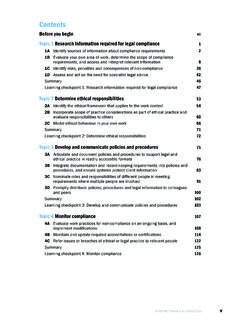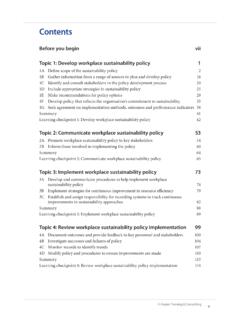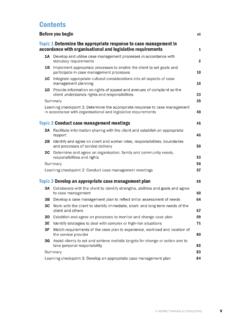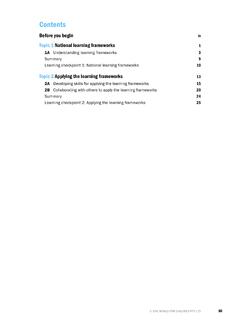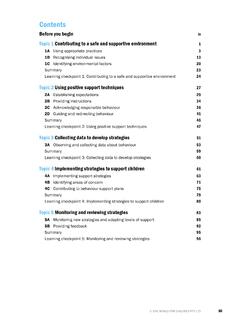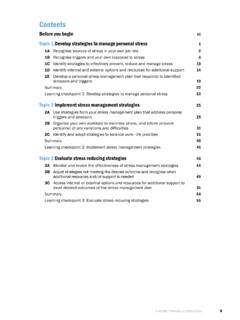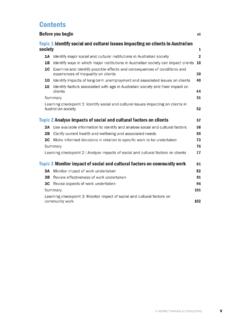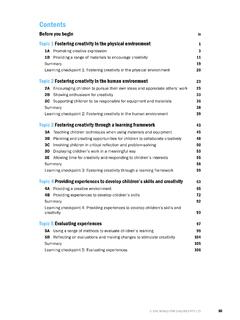Transcription of Contents
1 Aspire Training & ConsultingvContentsBefore you begin viiTopic 1: Plan financial management approaches 11A Access budget /financial plans for the work team 21B Ensure budget /financial plans are achievable, accurate and comprehensible 81C Negotiate any changes required to plans 131D Prepare contingency plans in the event that initial plans need to be varied 18 Summary24 Learning checkpoint 1: Plan financial management approaches 25 Topic 2: Implement financial management approaches 372A Disseminate relevant details of the agreed budget /financial plans to team members 382B Ensure team members perform financial tasks competently 412C Use resources and systems to manage financial management processes 73 Summary80 Learning checkpoint 2: Implement financial management approaches 81 Topic 3.
2 Monitor and control finances 933A Implement processes to monitor actual expenditure and to control costs across the work team 943B Monitor expenditure and costs on an agreed cyclical basis 973C Implement, monitor and modify contingency plans as required to maintain financial objectives 1073D Report on budget and expenditure in accordance with organisational protocols 112 Summary117 Learning checkpoint 3: Monitor and control finances 118 Topic 4: Review and evaluate financial management processes 1254A Collect and collate data for analysis 1264B Identify the effectiveness of financial management processes 1314C Implement and monitor agreed improvements 138 Summary141 Learning checkpoint 4: Review and evaluate financial management processes 142 Aspire Training & Consulting3To p i c 1 Plan financial management approachesFinancial budgetsFinancial budgets are also called financial plans.
3 They are focused on obtaining funds (cash) and the use of those funds for the advantage of the organisation. These budgets include the cost of finance in relation to the cost of obtaining capital through borrowing or other mechanisms; for example, capital raising through the sale of shares. Understand financial plansIt is your job to access and familiarise yourself with the following financial plans so you can explain them to members of your work team. In this way, they can understand the goals and objectives they are expected to achieve and the financial boundaries within which the team must operate.
4 Make sure you are familiar with, and can clarify with team members, relevant terminology such as cashflow, profit and loss, balance sheet, financial statement, capital expenditure, assets and liabilities, depreciation and lease versus purchase. The types of financial plans and budgets utilised depend on the size and nature of the business. Below are some definitions and explanations of budgets, plans and long-term budgets/plansLong-term budgets and plans are closely allied to an organisation s strategic goals and objectives.
5 They are generally developed for a five- to ten-year period. Short-term and operational budgets/plansOperational plans relate to the ongoing day-to-day and weekly activities of an organisation. They are focused on the operational side of a business in terms of achieving short-term goals and objectives associated with the expected expenditure and income of the organisation s goods and services. Operational plans are short-term plans that generally relate to an organisation s financial year. A significant part of this process is managing the budget on a day-to-day budget or cashflow projectionsCash budgets detail the expected cash/funds coming in and cash/funds going out for payments over time.
6 A negative position indicates cash is not available to pay accounts and thus additional monies may be required or action taken to delay some payments. Spreadsheet-based financial projectionsIn developing inputs, parameters for operational and financial budget spreadsheet models are often developed to provide a picture of the expected sales and expenditure for various departments or entities of an organisation. They can be used to set targets that are required in meeting sales objectives, expected expenditure and, therefore, profit.
7 By using the what-if approach in changing various parameters, such projections can be useful in providing guidance on the position of the organisation at some future point in time. Aspire Training & Consulting13To p i c 1 Plan financial management approachesYou may believe that a budget is not achievable without further financial resources being made available, or that allocations need to be altered to provide a better balance. In such situations you need to negotiate with others to change part of the budget to ensure you and your team can achieve designated targets.
8 Final approval for your budget remains with the financial is a key component of the process in developing accurate and achievable budgets within an organisation. budget changesChanges may need to occur for many reasons, some of which may be out of your control. Often budgets and financial plans span more than one area and the responsibilities for the budgets sit with more than one person. External decisions can impact an organisation and, consequently, its total budget . In many cases organisations have a contingency fund for adjusting budgets when are a number of reasons why budgets may have to be changed after they are put changes to a budget Initial costings have proven inadequate or inaccurate.
9 A new staff member is required but not included in the budget . The time allocated to tasks is unrealistic. Wage rises dictated by government or union action have increased staffingcosts. There is a corporate directive to reduce expenditure in all areas. There have been significant increases in supplier costs. A new, compulsory initiative that has not been budgeted for has to Negotiate any changes required to plans18 Aspire Training & ConsultingBSBFIM501 Manage budgets and financial plansAll budgets and financial plans are designed to be a framework within which the organisation works, so when you identify that they are no longer working or you are unable to achieve them, you need to vary or adjust them to meet the new circumstances.
10 It is good business practice to identify potential risks faced by your area/department in achieving organisational plans; perform a risk analysis and have contingency plans that can be actioned if and when a change occurs. A proactive approach is to incorporate risk management into the planning processes of the organisation and to have options readily risk The first step in financial risk management is to identify the financial risks that the organisation can face and how these would impact the budget .
